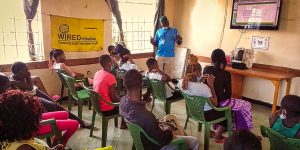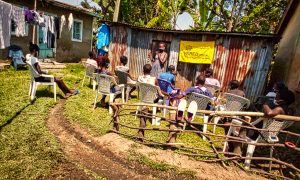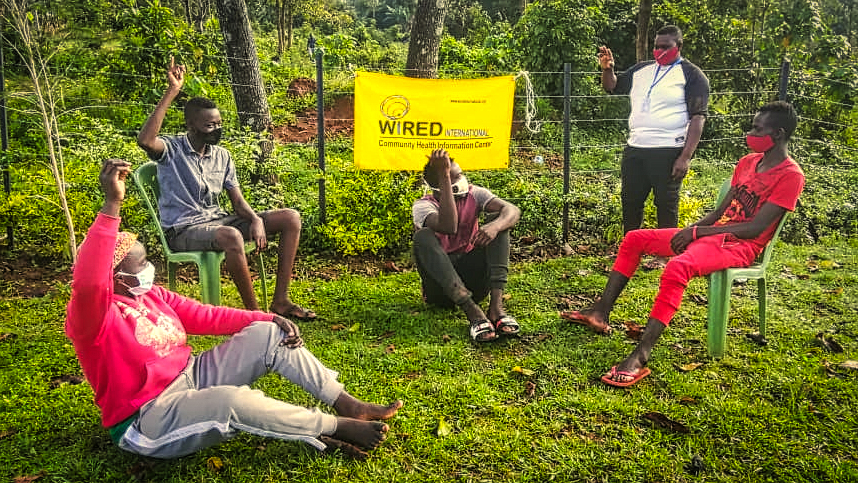WiRED Community Health Workers in Kenya
Helping Build Resilient Communities
By: Jessie Crowdy; Edited by Allison Kozicharow
WiRED International’s community health workers (CHWs) in Kisumu, Kenya, continue to be a beacon for their communities, providing guidance, information and support for health issues. Their work is particularly important in these pandemic times, as they provide health surveillance for other illnesses such as pneumonia and cholera which could be overlooked without their monitoring. From September 1 to September 27, 14 CHWs reached 6,679 people with health services on topics such as malnutrition, hypertension, pneumonia and HIV/AIDS.
 Following the sobering news last month that over 1 million lives have been lost to COVID-19 worldwide, The World Health Organization recently stated the urgent need for sustainable health preparedness to prevent future pandemics. In a recent press release, stressing the need for community empowerment, the President of the International Federation for the Red Cross and Red Crescent Societies, Mr. Francesco Rocca, highlighted that there is an urgent need to invest in preparedness at the community level, to “promote humanitarian action to be as local as possible, as global as necessary […] We call on governments, partners and donors to invest in preparedness at the community level to save lives and alleviate suffering in the next inevitable emergency.”
Following the sobering news last month that over 1 million lives have been lost to COVID-19 worldwide, The World Health Organization recently stated the urgent need for sustainable health preparedness to prevent future pandemics. In a recent press release, stressing the need for community empowerment, the President of the International Federation for the Red Cross and Red Crescent Societies, Mr. Francesco Rocca, highlighted that there is an urgent need to invest in preparedness at the community level, to “promote humanitarian action to be as local as possible, as global as necessary […] We call on governments, partners and donors to invest in preparedness at the community level to save lives and alleviate suffering in the next inevitable emergency.”
WiRED is answering this urgent global call, through its CHWs, who are uniquely placed to connect vulnerable populations with broader health care and provide a vital framework for building resilient communities.
An important part of the work carried out by these CHWs is gaining the trust of their communities in order to have an open and meaningful dialogue with those seeking support and treatment, many on sensitive issues such as teenage pregnancy, STIs and drug abuse.
 A crucial part of the CHWs’ engagement with the community is providing accurate, science-based information and dispelling any myths that hamper health efforts. We have read in several past CHWs’ reports that one of the biggest obstacles they face when discussing ways to prevent the spread of COVID-19 has been challenging erroneous transmission beliefs.
A crucial part of the CHWs’ engagement with the community is providing accurate, science-based information and dispelling any myths that hamper health efforts. We have read in several past CHWs’ reports that one of the biggest obstacles they face when discussing ways to prevent the spread of COVID-19 has been challenging erroneous transmission beliefs.
In a joint statement, WHO emphasized the dangers of misinformation during the current pandemic stating “Misinformation costs lives. Without the appropriate trust and correct information, diagnostic tests go unused, immunization campaigns will not meet their targets, and the virus will continue to thrive.” The statement went on to urge Member States to manage what they call an “infodemic” by “promoting the timely dissemination of accurate information, based on science and evidence, to all communities, and in particular high-risk groups; and preventing the spread, and combating, mis- and disinformation while respecting freedom of expression.”
This embodies the mission of WiRED’s CHWs and the invaluable work they carry out to protect those within their scope of care. Undoubtedly, the presence of CHWs leads to stronger, better informed communities that are able to work together to protect the most vulnerable.
Note: WiRED has almost completed the launch of the CHW project in areas of Peru and Nicaragua, which will expand the reach of the program into the Western Hemisphere. Look for stories on this effort in the coming week.


